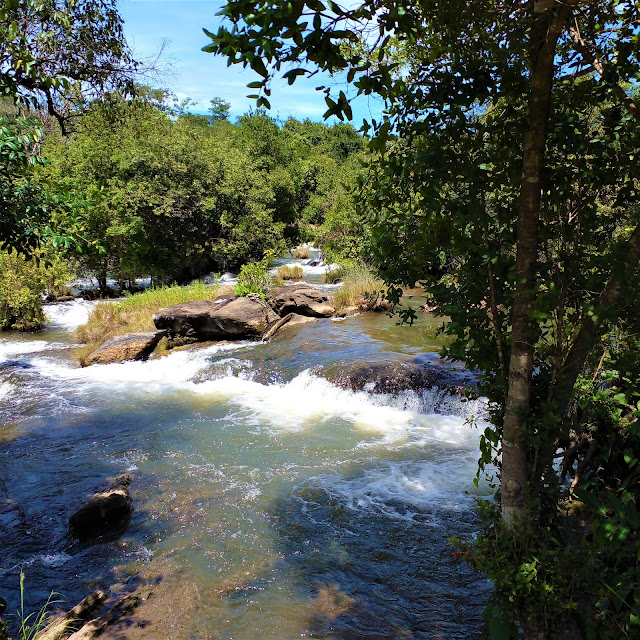I rummaged through my drafts and found this one worthy of publishing. It was written in 2016.
Throwing out food
Second week of service: I couldn't finish my oatmeal one morning. So I threw it in the rubbish pit, a six by six-foot hole in the ground. My host family's children ran by me and jumped in the pit with spoons as I walked away. They ate the rest of my oatmeal.
__
Mid-service: I shared popcorn with the kids and dumped the crumbs from the bottom of the basket onto the ground. The children flocked over the crumbs and to picked the ground clean.
__
Second year of service: A cake I baked burned on the bottom of a pan. I didn't want to eat it, so I scraped the charred-like brick and placed it in a bowl. A few lucky kids outside my hut devoured the treat I gave them.
Crying in front of Zambian villagers
My host brother had died a few days prior when I was visiting a friend's family. They were aware of the death, but they became uncomfortable when they saw me cry about it. When I left the family, my friend explained that hiding emotions are part of their culture. Crying like I had is not acceptable, but they understood I come from another country and accepted my behavior. So I learned to hold my emotions in.
Showing anger in Zambian culture is not acceptable. The only times I've seen Zambians show anger was by drunkards or by a mistreated child.
__
I spoke with a farmer one day, and he told me how his neighbor's oxen destroyed his entire maize crop. Maize grown by villagers is their food for the year. I asked what happens now that his maize crop is gone and what will his neighbor do to replace it. He replied that he was not angry with his neighbor. There is nothing anyone can do, and he is still friends with his neighbor. No hard feelings. No anger. Not wanting to get revenge or reparations.
Complaining
I brought my tendency to complain from the States, like: Ugh, this weather is terrible, or Ugh, no one came to my meeting. The friends I'd share my frustrations with would listen to me with wide eyes, stay silent, then change the subject when I was done ranting. I eventually stopped complaining in the village.
I learned I lived with people who accept what is given to them. I am certain situations frustrate them, but they don't show it. They are under control.
As far as complaining, their 'complaining' comes in discussion on improving a situation. There really is no complaining. It is liberating to be free from doing this ridiculous behavior.
__
Turning down privileges because I'm white...
I stood in an ATM line for close to an hour. I had eight people in front of me when a police officer carrying an old Ak-47 wandered over to help make the line more orderly (there were around 30 of us waiting). He looked at me while holding his gun and told me to go to the front of the line. Everyone looked at me. I stood there silently thinking of the right thing to do when the policeman again ordered me to go to the front. Finally, I reluctantly moved to the front of the line to use the ATM.
__
I arrived at a ceremony that had close to a thousand people attending. I noticed a group of white people sitting in front of the dance platform. Zambian culture is generous and honors guests regardless of color. I refused to sit up there with them. While looking at the group of whites, I realized I was not a guest anymore. I am a Zambian.
Privacy
There is no privacy in a Zambian village. Period.
Early on, living in my village, I came down with a cold, so I stayed inside my hut. The second day shut inside, I heard my neighbor calling my name. I ignored her; she knew I was sick and figured she would leave, assuming I was asleep. While lying there peacefully on my bed, I was startled by my neighbor calling me just outside my window behind my bed; she was looking inside right at me. I got up and met her outside to encourage her to leave. Unfortunately, she didn't speak English, and I was too flustered to explain to her in her language to leave me alone.
Later I spoke with her husband and told him what she had done. He was surprised by my concern because he explained in his culture when someone is sick, they are visited and given food. I explained that we are left alone unless we give the OK for a visit. Both of us learned the differences of this part of the culture...privacy and the lack-there-of.
__
When I finished bathing in my bathing shelter, I exited donned in a towel with wet hair carrying my clothes tightly against my chest to ensure my towel wouldn't fall off. I paraded in front of an audience of the neighborhood kids sitting in front of my hut. It was silent as I walked past toward my hut. As I opened the door to walk in, the kids burst into laughter. I smiled to myself and was glad to give them a laugh. #Zambia #Peacecorps















































